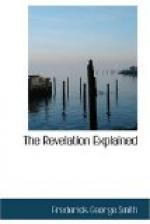Having failed in his direct attacks against the Christian church, with the accession of Constantine, who established Christianity as the State religion, the dragon soon clothed his pernicious principles in a Christian garb and made war against the remnant of the woman’s seed that kept the commandments of God, through the rising hierarchy, under the name of Christianity; but his heads and horns being visible, and he being unable to control his tongue, his real sentiments crop out, and he is easily identified. It is not to be supposed, however, that the beast would appear suddenly in full possession of the immense power ascribed to him in this chapter. On the contrary, Daniel represents it as a little horn at first, whose look finally became “more stout than his fellows.” Dan. 7:8, 20. Such ecclesiastical power was attained only by the process of gradual development. According to the vision his universal power was limited to “forty and two months,” or twelve hundred and sixty years. Since this has reference to the beast as an ecclesiastal power, which according to Daniel grew up by degrees, the time should be calculated the same as in chapter 11:2, 3—dated from the time when the external, visible church was wholly in the hands of the profane multitude of Gentiles and the true church crowded into the wilderness. The nationalized hierarchy, however, continued to advance to greater degrees of power over the nations, until it reached its zenith under the pontificate of Gregory VII., A.D. 1073-1080.
The great things and blasphemies spoken by this beast are doubtless fulfilled by the prerogatives and rights belonging to God alone which this apostate church, especially through her regularly constituted head, claims. In fact, the Pope is the real mouth of this beast, the one who dictates her laws with great authority. He claims to be the vicar of Christ on earth and supreme head of the church, even, as in the case of Pope Innocent, denominating himself the one before whom every knee must bow, of things in heaven, and things on earth, and things under the earth. He claims power over the souls of all men on earth and even after their departure from earth. If this is not blasphemy against God, his tabernacle, or church, and “them that dwell in heaven,” then I am wholly unable to imagine what would fulfil the prediction. Among the blasphemous titles assumed are these: Lord God the Pope, King of the World, Holy Father, King of kings, and Lord of lords, Vicegerent of the Son of God. He claims infallibility (which was backed up by the Ecumenical council of 1870) and has for ages. Further, he claims power to dispense with God’s laws, to forgive sins, to release from purgatory, to damn, and to save.




